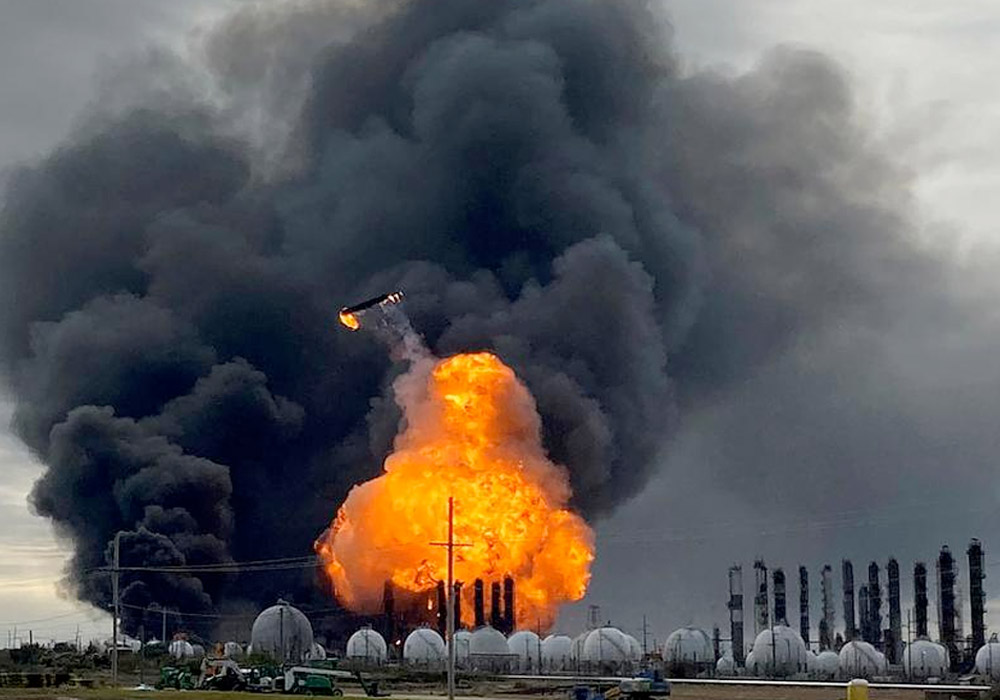On the morning of Wednesday, November 27, 2019, an explosion involving a processing unit was reported at TPC Group Port Neches, Texas Operations site, east of Houston and less than 10-miles from Port Arthur Texas. No official statement has disclosed the full names of chemicals or toxicants being released into the air and surrounding community during the ongoing fire. The TPC Group Plant has a total of 175 full-time employees and 50 contractors, all personnel on-site have been evacuated and 3 personnel sustained injuries, 2 personnel of TPC Group and 1 contract worker. All 3 injured personnel were taken to the medical center in Southeast Texas, and one was later transported to Memorial Herman in Houston.
“My father was a United Steelworker who succumbed to cancer in 2016. I am well aware that symptoms from this chemical disaster may not surface for years to come. Workers’ medical needs should be covered by TPC for years to come because of known bioaccumulation of both known and unknown chemicals exposures in the body. This facility is has a history of non-compliance, which means that workers bodies absorbed the costs in health impacts. Workers are the first line of defense when these chemical disasters happen. These expenses should be covered by TPC this is the cost of having unsafe business practices, otherwise, they will continue business-as-usual.” -Ana Parras, Co-Executive Director T.e.j.a.s and former President of AFSCME, Local 3242, Corpus Christi, Texas
Incident command was established offsite at the Huntsman Administration building due to the size of fire and inability to get into the location. No immediate shelter-in-place was ordered for the surrounding community until 9:00 am, as of 6:00 pm a total of 50,000 people are under mandatory evacuation. According to the EPA Region 6 and local officials, the main chemical of concern is 1,3-Butadiene although other chemicals may be involved. 1,3-butadiene is a gas used in the production of styrene-butadiene rubber, plastics, and thermoplastic resins. This chemical is carcinogenic, meaning it’s cancer-causing and has both short and long term effects including: irritation of the eyes, nasal passages, throat and lungs, neurological effects, blurred vision, fatigue, headache, and vertigo have also been reported at very high exposure levels. Skin exposure causes a sensation of cold, followed by a burning sensation which may lead to frostbite. Thousands of peo
“We will be spending thanksgiving under shelter-in-place and evacuation orders. We are now 35 hours after the initial blast that started at 1 am yesterday morning at the TPC plant, a known violator of the Clean Air Act, it will most likely burn throughout the night. We woke up to a fiery blast the day before Thanksgiving. This is life for our communities sitting at the fence-line of the petrochemical corridor along the gulf coast. Evacuation orders have only gone out to a 4- mile radius and more than 50,000 southeast Texans have evacuated. We live in an ever-growing petrochemical corridor because of the billions of dollars being invested in petrochemical infrastructure. Not even a full week after the Trump EPA Chemical Disaster Rule rollback. A rule that would have provided common-sense prevention rules in place during catastrophic events like this TPC Disasters.”
-Hilton Kelly, CIDA Inc. Founder & Director,
Just six days ago Trump's EPA slashed common-sense protections under the Chemical Disaster Rule that could have mitigated the harm faced by communities impacted by disasters like this one. Protections including root-cause analysis, third party inspections and improved communications with first responders and local authorities. The impacted area included several vulnerable areas including residences and schools. The school district of Port Neches-Groves has a total of 11 schools with a total of 5,131 students, 39.1% are economically disadvantaged. All 11 schools sit inside the 4 mile radius of the chemical fire this includes: Taft Elementary, Groves Elementary, West Groves Education Center, Van Buren Elementary, Groves Middle School, Ridgewood Elementary, Port Neches Elementary, Port Neches Middle School, Port Neches- Groves High School, Woodcrest Elementary, and Alternative Education Center.
“People should be spending their holiday with families, instead they have been displaced due to no fault of their own. Fortunately, schools were not in session. What if the blast occurred during school hours? How many children and teachers would have suffered? Disasters like these are preventable, it shouldn’t take a chemical explosion for local, state and agency officials to take action and realize the dangers of chemical facilities.” - Nalleli Hidalgo, Community Engagement and Education Liaison
The TPC fire is not the first, nor last of explosive chemical disasters occurring in Texas. The frequency of chemical plant explosions are endangering workers' lives on-site and raises concerns of public health issues for frontline communities. We are reminded of the recent fire at the ExxonMobil and the ITC facility on March 16, 2019 and March 17, 2019 in Baytown, Texas and Deer Park, Texas. All incidences found in the southeast Texas petrochemical corridor, east of Houston, Texas. We remain adamant that local, county and state officials implement a Regional Air Toxics Plan and support reinstating the Chemical Disaster Rule, which the current administration recently rolled back. We also want to urge the general public to seek legal remedies outside of the claims hotline and make a full assessment of damages including health impacts. We urge you not to come in direct contact with ash and other debris. Other considerations to keep in mind are the use of ponds, swimming pools and other open waters used for recreation, please avoid exposure to chemical ash and other debris that could have settled on these bodies of water. The same consideration should be given to ash and debris that has landed near residences, including but not limited to metal, charred material, and fire retardant foam that can potentially land on people's residences, vehicles, and other property. If ash is located on your property avoid cutting lawns. The maintenance of lawns and other landscape can agitate any particulate matter. Instead, call local health and safety departments and take pictures and video of debris if permitted to return to your residences. If you are feeling any side effects visit your physician and maintain a record of your health. Document any symptoms including but not limited to the symptoms affiliated with 1,3-butadiene exposure. Local command stated that other chemicals may have been involved.
For these and additional concerns Texas Environmental Justice Advocacy Services urges residents in the area affected to evacuate and seek safety with friends and relatives further from the facility. Please remain calm and cautious of current and future road closures and weather events that may complicate the situation. Local officials have not called for a mandatory evacuation outside of the 4-mile radius but we urge those at further distances to take precautions and make decisions best for themselves and family members. Tejas also urges the surrounding municipalities and communities including but not limited to Port Arthur, Port Acres, Pear Ridge, Griffing Park, Lakeview, Central Gardens, and Viterbo, and communities in-view of the plume to take precautions and limit outdoor exposure due to unknown substances that the plume may carry. Texas Environmental Justice Advocacy Services is not a government agency or county entity to mandate evacuation. We are a 501(c)3 registered environmental advocacy nonprofit that seeks to educate and inform communities on the environmental issues of concern. Due to the concentration of production, storage and other sensitive materials in and around the area we remind the public to stay abreast of the situation as they are out during the day before the Thanksgiving holiday. A Red Cross shelter is being set up at Ford Park in Beaumont according to Chester Jourdan, executive director of the American Red Cross of Southeast and Deep East Texas.
As local, state, and agency officials release statements that their data, based on handheld air monitors is safe; community members continue to sit beneath a massive plume of toxic-chemical smoke. TPC is a petrochemical facility known to have a history of air permit violations according to the Enforcement and Compliance History Online (ECHO), an EPA database. ECHO data has documented TPC as a facility with over 12 quarters of violations dating back to 2017.
“Don’t tell me that health and safety is the topmost priority for TPC a known violator of the Clean Air Act. Children, elderly, pregnant women and so many others are being exposed to cancer-causing 1,3-butadiene. We have no information on the full slate of chemicals being released or the amounts. I appreciate local officials evacuating community members and taking intentional steps to protect public well-being it is a step up from the efforts during the ITC Disaster, and yet TPCs official updates lack the detail and information that ITC handed to the affected community. What we need is for the TCEQ to stop handing out air permits like candy and for the state to lift caps on financial penalties for facilities to fully enforce the letter of the law. How does a known-violator of the law keep getting permission to operate? This is not the first time TPC undermines community well-being. Their activity is criminal and TPC should not be allowed to continue to operate. I hope the general public understands this type of production is not one based on energy demand but the production of plastic goods. This is the real cost of plastic.” – Yvette Arellano, Policy Research and Grassroots Advocate, T.e.j.a.s
Both T.e.j.a.s and CIDA release this statement jointly believing that no community should have to face a chemical disaster as everyone, regardless of race or income, is entitled to live in a clean environment.
Contact: Yvette Arellano, T.e.j.a.s Policy Research and Grassroots Advocate, 281-919-5762, arellano.inbox@




